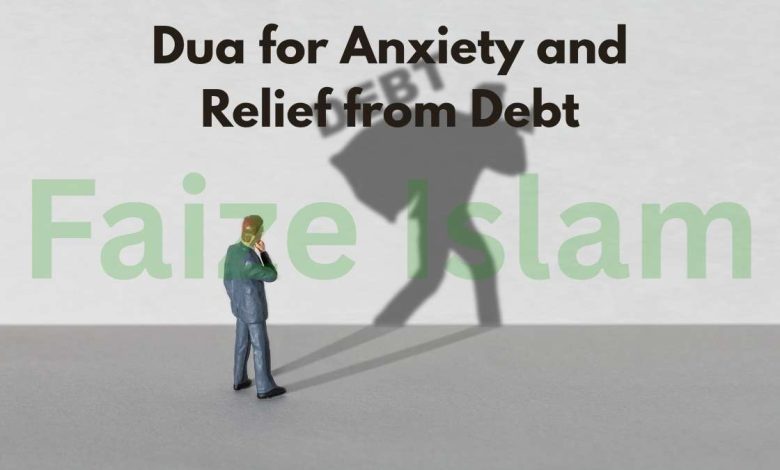Dua for Anxiety and Relief from Debt

Dealing with anxiety and distress, especially when burdened by debt, is a struggle many people face. However, there is a special prayer taught by Prophet Muhammad صلی اللّٰہ علیہ و سلم to His companion, Abu Umama رضی اللّٰہ عنہ, that offers solace and relief. This prayer is a remedy for anxiety, sadness, weakness, and the overwhelming feeling of being trapped in debt. It has been narrated in authentic hadith collections, providing both spiritual and practical guidance.
The Dua for Anxiety and Relief from Debt
The following prayer, as instructed by Prophet Muhammad صلی اللّٰہ علیہ و سلم to Abu Umama رضی اللّٰہ عنہ, is to be recited in the morning and evening, seven times each. The prayer reads:
اَللّٰهُمَّ اِنِّیْ اَعُوْذُ بِكَ مِنَ الْهَمِّ وَ الْحَزَنِ، وَ اَعُوْذُ بِكَ مِنَ الْعَجْزِ وَ الْكَسَلِ، وَ اَعُوذُ بِكَ مِنَ الْجُبْنِ وَ الْبُخْلِ، وَ اَعُوْذُ بِكَ مِنْ غَلَبَةِ الدَّيْنِ، وَ قَهْرِ الرِّجَالِ
O Allah! I seek refuge in You from anxiety and sorrow, from weakness and laziness, from cowardice and miserliness, from being overwhelmed by debt, and from the oppression of people.
Significance and Benefits of the Dua
This powerful supplication seeks refuge in Allah from various forms of distress and hardship. The Prophet صلی اللّٰہ علیہ و سلم advised Abu Umama رضی اللّٰہ عنہ to recite this prayer when he was suffering from both overwhelming worries and the burden of debt. The supplication serves as a way to ask Allah for help with not only alleviating emotional distress but also for resolving financial difficulties.
The Prophet صلی اللّٰہ علیہ و سلم’s advice highlights how such supplications can serve as a means of seeking divine intervention in times of trouble. Abu Umama رضی اللّٰہ عنہ followed this advice, and as a result, Allah relieved his anxiety and cleared his debt.
The Hadith: A Story of Relief
The hadith regarding this prayer has been narrated in Sunan Abu Dawood (Volume 1, Page 227), where the companion Abu Umama رضی اللّٰہ عنہ is reported to have encountered the Prophet صلی اللّٰہ علیہ و سلم in the mosque at a time when he was not there for prayer. The Prophet صلی اللّٰہ علیہ و سلم, noticing his distress, inquired about his troubles.
Abu Umama رضی اللّٰہ عنہ shared that he was troubled by many worries and had heavy debts. Prophet Muhammad صلی اللّٰہ علیہ و سلم, upon hearing this, offered him the remedy of the above dua, saying:
Would you like me to teach you words that, if recited, would remove your anxiety and pay off your debt?
Abu Umama رضی اللّٰہ عنہ eagerly accepted, and the Prophet صلی اللّٰہ علیہ و سلم instructed him to recite this prayer in the mornings and evenings. Abu Umama رضی اللّٰہ عنہ followed this advice, and, by the grace of Allah, his anxiety was lifted, and his debts were cleared.
This hadith is also found in Sunan at-Tirmidhi (Volume 5, Page 452), confirming its authenticity and significance.
A Remedy for All: Universal Benefits of the Dua
This prayer is not only for those in debt but can be recited by anyone facing emotional or psychological distress. The key elements of this dua cover various types of struggles:
- Anxiety (اللّٰهم) and sadness (الحزن): A plea for relief from negative emotions that weigh down the heart.
- Weakness (العجز) and laziness (الكسل): A request for strength and motivation in times of personal or professional challenges.
- Cowardice (الجبن) and miserliness (البخل): Seeking courage and generosity to overcome self-doubt and selfishness.
- Overwhelming debt (غلبة الدين): A specific supplication for those burdened by financial obligations.
- Oppression by people (قهر الرجال): Asking for protection from the injustice or harm caused by others.
Conclusion
The dua for anxiety and relief from debt, as taught by Prophet Muhammad صلی اللّٰہ علیہ و سلم, serves as a powerful tool for anyone seeking Allah’s help in times of distress. Reciting this prayer regularly can bring peace to the heart, clarity to the mind, and solutions to problems, especially financial ones. It is a reminder that seeking refuge in Allah’s mercy and relying on His wisdom can turn any difficult situation into an opportunity for spiritual growth and relief.
FAQs
When should I recite this dua?
It is recommended to recite this dua in the morning and evening, seven times each. It can also be recited at any time of distress or need.
Can this dua help with financial issues?
Yes, this dua specifically asks Allah to relieve the burden of debt and financial difficulties. Many people have experienced relief through its recitation.
Is there any special time or condition for reciting this dua?
There is no specific time other than the morning and evening, but reciting it sincerely with faith during moments of hardship can be particularly beneficial.
Do I need to understand Arabic to recite this dua?
While understanding the meaning of the prayer can enhance its impact, the dua can be recited in its original Arabic form for those who know the pronunciation. It is also beneficial to learn the translation to understand its full meaning.
How long should I recite this dua for it to be effective?
The dua can be recited for as long as you feel necessary. Consistency in reciting it daily, particularly in the morning and evening, is key to experiencing its benefits.




